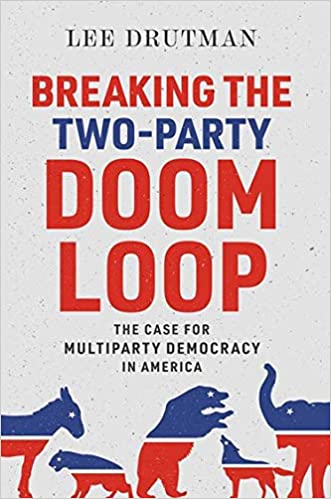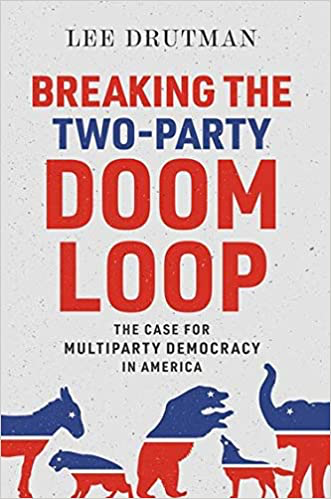1. Review of Lee Drutman's Breaking the Two-Party Doom Loop: The Case for Multiparty Democracy in America

Review by Walter Horn

Lee Drutman, Breaking the Two-Party Doom Loop: The Case for Multiparty Democracy in America (Oxford UP, 2020)
Observers of governments have been fascinated by political parties (or “factions”) at least since the time that James Madison and Alexander Hamilton were voicing their dread of them in The Federalist Papers. Are they akin to pressure groups, lurking around the edges of legislatures pushing for special treatment, or are they rather what actually becomes the government when their preferred candidates win elections? Can democracies exist without them or are they necessary if people are to get what they really want from their rulers? For good or ill, however, as political science advanced into the 20thCentury, many of its leading lights began to lose sight of the importance of parties.
In the 1940’s, E.E. Schattschneider, surely the most elegant writer of the American political scientists of his day, derided democratic theorists for ignoring the primary importance of political parties in placing particular issues before the electorate. He pointed out that
'People submit to…assumption of power by the parties because they cannot help themselves. The immobility and inertia of large masses are to politics what the law of gravity is to physics. This characteristic compels people to submit to a great channelization of the expression of their will, and is due to numbers, not to want of intelligence. An electorate of sixty million Aristotles would be equally restricted. In other words, the parties take from the people powers that are merely theoretical. Nature, having first made numbers what they are, limits the effective powers of the people, and the parties merely take advantage of the fact. The people are a sovereign whose vocabulary is limited to two words, “Yes” and “No.” This sovereign, moreover, can speak only when spoken to. As interlocutors of the people, the parties frame the question and elicit the answers. To say this is not to disparage democracy; it merely demonstrates that parties are made possible by nature’s limitations on the behavior of large numbers of people.'
This crucial insight sparked an enduring movement on behalf of “strong, responsible parties.” On this view, parties should be understood to be ready, willing, and able to “take over governments” when they win elections. As it seemed that coherent and effective public policy could be obtained in no manner other than party control of the levers of power, many of Schattschneider’s followers agreed with him that a system involving exactly two parties is best. These two behemoths compete for control in regular elections, and, whichever one may prevail, the voters retain the ability at the next election to remove those victors in favor of the opposing group. Furthermore, according to the responsible party theorists, we should look for the essential signs of democracy only in competitions betweenthe two parties during elections and never expect to find them within the inner workings of the adversary entities themselves.[2]And, since it was discovered to be the case that under Duverger’s Law single-winner electoral fights generally produce exactly two competing parties, these theorists held that voters who desire efficient, comprehensible governments having the ability to handle any and all crises that come their way should learn to love single-winner districts.
As one expects to find when an all-encompassing (not to say magisterial) account of anything is proffered, academics soon began to look for possible points of disagreement with Schattschneider, and came to range themselves throughout a logical space determined by coordinates connected with particular areas of agreement/disagreement with his perspective. For example, a theorist might insist that no party can be coherent that contains large numbers of members holding wildly differing worldviews (as the “big tent” American parties of the 1960s and 70s did) and, fearing such large, coherent factions, agree with Madison that it is crucial to the stability of any democracy that there be manyparties rather than just two. Another might agree with Schattschneider on the importance of strong, responsible parties, but deny that any one of them should be thought to be “taking over the government” subsequent to an election. Again, academics differed on whether a party really is its members, considering that such membership comes with no fees or other obligations.
In his engaging Breaking the Two-Party Doom Loop, Lee Drutman quite sensibly takes middle positions on a number of such issues. For example, he claims that partisanship is beneficial so long as polarization does not reach a point where communication and compromise become impossible. And he considers negative campaigning valuable as an information-producing device, so long as it is not sonegative that it is nothing but the slinging of epithets at a reviled enemy. He misses the bipartisanship of the less specific and passionate Democratic and Republican parties that he grew up with, but believes there can also be too much comity, an attitude that may result in parties that are squishy and undifferentiable. Drutman meticulously provides the genesis of the current characteristics of the two major parties in the U.S. by offering up fascinating histories of the Democratic Republicans, Whigs, Progressives, and other past U.S. parties—both regional and national. His empirical investigations, both comparative and historical, lead him to the conclusion that the Big Problem with contemporary U.S. governance is that the more our two major parties differentiated (or “sorted”), the more they began to amass a stockpile of hostility toward their opponents, finally reaching a point where animosity became fatal to consensus—or even fruitful discussion on any subject. It may once have been thought that any longstanding state of hyper-partisanship state is prevented by the truth of Downs’ “median voter theorem,” according to which parties will always seek the centrist voters who make up the majority, but Breaking the Two-Party Doom Loop makes a compelling case that those who continue to make such arguments rely on outdated and over-simplified assumptions about the electorate and the voting systems under which they act.
In describing the cause of our current “doom loop” of democratic paralysis, Drutman writes that
'In contemporary American politics we have what I’ll call “toxic partisanship,” which generates “toxic politics.” Toxic politics stand in contrast to healthy politics. In healthy politics, different sides may disagree (as they should), but they are not dug in so far as to equate any compromise with surrender. In healthy politics, the opposition is never the enemy. In healthy politics, partisan loyalty exists, but it has limits. In healthy politics, the different sides can be far apart on specific issues, but they do not see politics as a zero-sum, binary, us-against-them contest for the fundamental character of the nation.'
Fortunately, on Drutman’s view, escape from this abyss remains achievable, and he tells us what he takes to be the institutional changes that must be made if democracy in the U.S. is to be resuscitated. First and foremost, he believes that we must have more than two significant parties. At present, fear of wasting votes means that the third-party candidates can never succeed—leaving all such parties minor. Drutman’s solution involves moving to ranked choice ballots and reintroducing multi-winner districts for seats in the House of Representatives. This would help because, pursuant to Duverger’s Law, the number of major parties present in any jurisdiction is almost entirely a function of the number of possible election winners there. With no single party capable of taking over the reins of power, comity and consensus-building can be regained, exactly what Drutman takes to be necessary to a fully functioning democracy. The sorts of parties Drutman admires are the single-minded, laser-focused type that one can find in places like Germany, Israel, and the Netherlands. On his view, such parties not only need to compromise to gain any allotment of power, they also may not care much about various components of government policy that may be very important to the parties with whom they will need to join forces and deal. That kind of scenario is precisely what consensus-aimed bargaining requires.
Drutman dreams of a different sort of democracy than we are used to in the U.S., certainly, one with smaller, more focused parties and lacking any specific opposition (loyal or not). But it would be a system, according to Drutman, that would, if historical and comparative studies are to be believed, find American voters streaming to the polls in droves and quite happy with their elected officials. In a word, Drutman believes that the solution to the death spiral he dreads can be found only in the strong (but not too strong)[3] smaller parties that he believes would emerge from multi-winner electoral districts. I think we should take both his fears and his prognostications seriously. Indeed, this book seems to me chock full of plausible predictions regarding what one might expect if we do nothing or enact reforms of the sort he supports.
I am nevertheless left with deep misgivings. While these may stem from the fact that my background is in philosophy rather than political science, I must say that I find Drutman’s historico-empirical predilections to constitute the main weakness as well as the great strength of his book. Drutman seems to me a subtle decision-theorist and prognosticator. He has studied the data and the history; and his analyses seem to me acute and well-argued, always considering both short- and long-term consequences. I therefore do not want to suggest that the moves he proposes be ignored or discounted. My problem is that they seem to me to flow from various ends that I take to be inappropriate if one’s goal is authentic democracy: a fair, non-discriminatory system which accurately assesses and tries to deliver what the people desire from their governments. Drutman wants to see a stable, liberal, “broad consensus” rule in the U.S. I find nothing particularly objectionable about such ends myself. But…they’re not constitutive of democracy: they’re just personal preferences that any given democrat might or might not share. This follows from the fact that those ends neither individually nor jointly require—or are required by—authentic self-government. Either a failure to recognize or to care about this fact may be the reason that Drutman also does not see that no real democrat will be content to depend on such fragile reeds as party policies or voting rules to ensure the continuance of majoritarian self-government. If we are concerned with what Trumpism might do to what little there is left (or, in my view, has ever been) of democracy in the U.S., surely it makes more sense to focus on shoring up the Constitution to prevent January 6, 2021-type attempts at state legislature overturns of fair elections, than to muse about the benefits of adding parties or moving to RCV. For even where there are many parties, one of them can take over and declare its candidates to be kings unless they are absolutely prevented from doing so. In fact, as Drutman sometimes almost concedes, in neither presidential nor parliamentary systems can the multiplication of parties provide a guarantee against authoritarianism. Consider Brazil and Hungary.
This blindness (or apparent indifference) is why Drutman’s undeniable talent for calculating plausible estimates of future conditions given this, that, or no electoral reform can provide so little comfort to the fearful. Suppose, e.g., that someone joins with Drutman in cheering what she takes to be the fact that multiparty legislatures in proportional democracies “have a strong record of producing broadly acceptable moderate policy outcomes.” And suppose further that she therefore does her utmost to produce the conditions for such results. If she is a real democrat, she will nevertheless continue to understand that self-government neither requires nor can be certainly saved by “acceptable moderate policy outcomes.” What is required is not that governmental results are “broadly acceptable,” but that they are what the people actually demand via fair elections. If “doom” means non-democracy, it is clearly consistent with three, four or five significant parties.
The prerequisites for and entailments of authentic democracy are mostly independent of the virtues or flaws of any specific number of parties—so long as no particular number is mandated or prohibited. Furthermore, a true supporter of democracy is unlikely to make destructiveness to two-party systems the principal reason for supporting proportional representation: democratic principles require that minority viewpoints be represented whether or not such proportionality produces additional parties. Similarly, support for RCV rather than some other voting system that can also provide proportionality requires a defense of that particular ordinal mechanism, a system that runs afoul of Arrow’s proof, and Drutman makes no such argument. It’s the minority representation that’s required by true democracy, not RCV. Indeed, we should not even claim the necessity of additional parties unless we can show that such additions are needed for all citizens to get their required say.
If one is looking for an updating of the case for “strong” parties that was provided by Schattschneider, one can find good arguments involving their indispensability in Bawn et al.[5] Once convinced of that, one might go on to make reasonable inferences regarding the utility of open or closed primaries, etc. But, if such procedures are to be democracy-maintaining or enhancing, arguments for them cannot be based solely on predictions regarding what might produce more stable or consensus-focused governments. In addition, our arguments must not use any sort of liberal or conservative ends as goalposts. As Yascha Mounk has pointed out,[6] democracies may be illiberal, and liberal polities may be undemocratic. And there should be no doubt that democracies may also be radical rather than conservative. Sound democratic theory requires that noend be allowed to displace that of fair, non-discriminatory self-government. If an actually authentic democracy produces results that we don’t like, we must understand that any changes proposed to “fix” it are quite likely to be anti-democratic. All that seems to me to be absolutely indispensable in both advocacy for democracy and non-proselytizing democratic theories as well is the recognition that, if we are to have legitimate self-rule, no particular goal may be allowed to displace that of fair democratic procedures.
Footnotes
[1] E.E. Schattshneider, Party Government (Rinehart & Co., 1942)
[2] Intra-party democracy might mean letting independents—or even members of Party B—vote in Party A’s primaries, something that is anathema to strong-party theorists. For a statement from those who think intra-party democracy is a good thing, see Unite America Institute, The Primary Problem(March, 2021).
[3] Drutman says that those who want even stronger parties than he does can be likened to “communist zealots who argue that the problem with communism is that true communism has never been tried.” For, on his view, “believers in a more responsible two-party system cling to [the] similarly unfalsifiable idealism [that] American political parties can never be strong enough, at least not in a two-party system.” Drutman himself takes the present “strength” of the Democratic and Republican parties to be sufficient and finds their deficiencies elsewhere.
[4] “A Theory of Political Parties: Groups, Policy Demands and Nominations in American Politics,” in Perspectives on Politics (2012). I have given my own summary of that case here.
[5] The People Versus Democracy (Harvard UP, 2018)
[6] For my take on these matters, see my Democratic Theory Naturalized: The Foundations of Distilled Populism (Lexington Books, 2020), as well as my discussion with Richard Marshall here at 3:16 AM.

About the Author
Walter Horn is a philosopher of politics and epistemology.
His 3:16 interview is here.
Also keep an eye out for future chapters of this Hornbook of Democracy Book Reviews